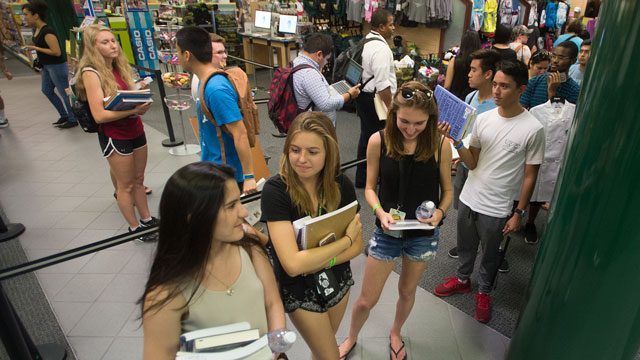Angela Shih, chair of the mechanical engineering department, has seen the plight unfold in her classes: Financially strapped students unable or unwilling to pay $250 for a textbook who end up limping through their courses, often failing them.
"A lot of students are using illegal pdf copies of the textbook instead," Shih says. "Many of the classes have open-book finals, which hurts students who don't have a book. They aren't allowed to use the pdfs for those."
The concern about the lack of accessibility to textbooks and its impact on student success eventually spurred the development of mechanical engineering online or MEOnline, a website with more than a million hits and 6,000 subscribers worldwide launched in April 2016 to provide a video resource hub for those taking courses in thermodynamics, fluid mechanics and stress analysis. The creation of MEOnline also spoke to the department's desire to actively seek opportunities to cut textbook costs by providing the video resources on the website.
That same desire to increase student success and help those struggling to pay for textbooks fueled the university's Affordable Learning Initiative (ALI) that was launched four years ago to tackle this issue.
The mechanical engineering department and ALI began collaborating last year and received a $50,000 grant from the CSU Chancellor's Office to increase the adoption of e-textbooks and other online resources to cut costs for students.
With the estimated annual cost of textbooks exceeding $1,000, lawmakers and educators have continued to work on solutions.
Gov. Jerry Brown signed the College Textbook Affordability Act, encouraging faculty to use more online educational materials and providing professional development for professors who tap into free digital materials. The goal of the law, which went into effect on Jan. 1, 2016, is to reduce the cost of class materials by 30 percent in courses in which open education resources are used. Campuses who meet certain benchmarks to further reduce costs after a year are eligible for additional funding.
Instead of the standard three-to-six-month rental agreement, Shih negotiated with publishers to secure a three-year deal for mechanical engineering e-books. Because engineering courses are sequential, it's important for students to keep their textbooks from their fundamental classes, Shih added. The increase in the length of the subscription period made that possible and more affordable, with the e-version of textbooks ranging from $90 to $115.
That agreement also helped the university secure the CSU grant for the collaboration between the mechanical engineering department and ALI.
"We found out about ALI by accident," says Shih, who became a faculty member in 1995 and was named department chair in 2012. "Our department has been working on trying to help students with high failure rate courses since 2006. ALI was looking for partners to apply for a grant."
Faculty from the department first posted PowerPoint slides and notes online, then started developing videos in 2013-14 after receiving funding from the CSU Chancellor's Office to redesign courses, Shih says. Students have access to 200 videos and short clips as supplemental resources to help students pass their courses.
Shih says it was during a presentation Emma Gibson, the University Library's department chair and head of public services, gave on ALI that she realized her department, the library and Bronco Bookstore had similar missions: to cut textbook costs for students.
The university's effort grew out of the CSU Affordable Learning Solutions program launched in 2010. CSU campuses, spurred by the federal Higher Education Opportunity Act of 2008 that required colleges and universities to provide students with more information to help them manage textbooks costs, devised the program.
Cal Poly Pomona's ALI program taps into a variety of strategies, including the use of e-books, textbook rental, library reserves and online resources.
The library- and Bronco Bookstore-led initiative has saved students $5 million since 2012, says Gibson, who also serves as chair of the university's ALI steering committee.
The initiative is giving students an academic lift by making a list of e-books available that correlate with textbooks that professors are using, she says. The library has 92 titles in its e-book collection, Gibson says.
University Library Dean Ray Wang says with 50 percent of Cal Poly Pomona students eligible for a Pell grant, action is needed to further cut costs.
One of the university's missions is to close the achievement gap among students and wipe out D and F grades, as well as unplanned withdrawals. Ensuring that students have affordable, low-cost materials for their courses will help Cal Poly Pomona meet its goal, he adds.
"We really need to make it a moral imperative to help our students with textbook costs," he says. "When students are pushed to choose between food and textbooks, guess what they are going to choose? When they don't have textbooks, they don't tend to do very well in their classes."


